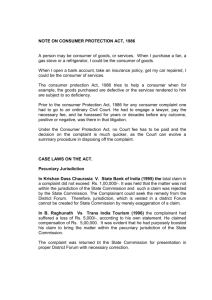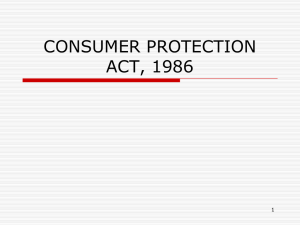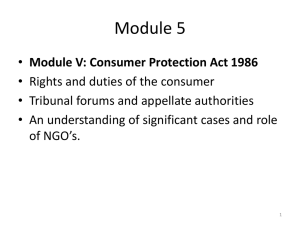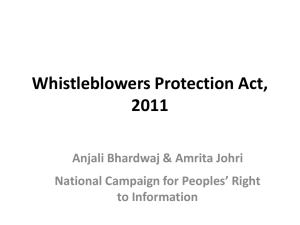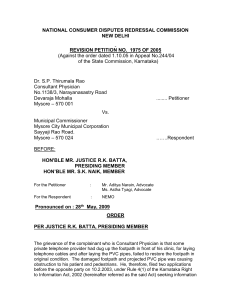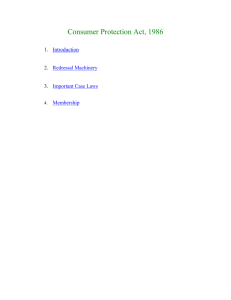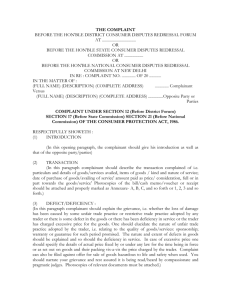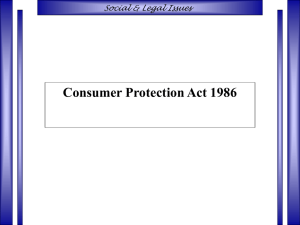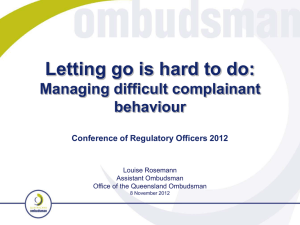Consumer Protection Act
advertisement
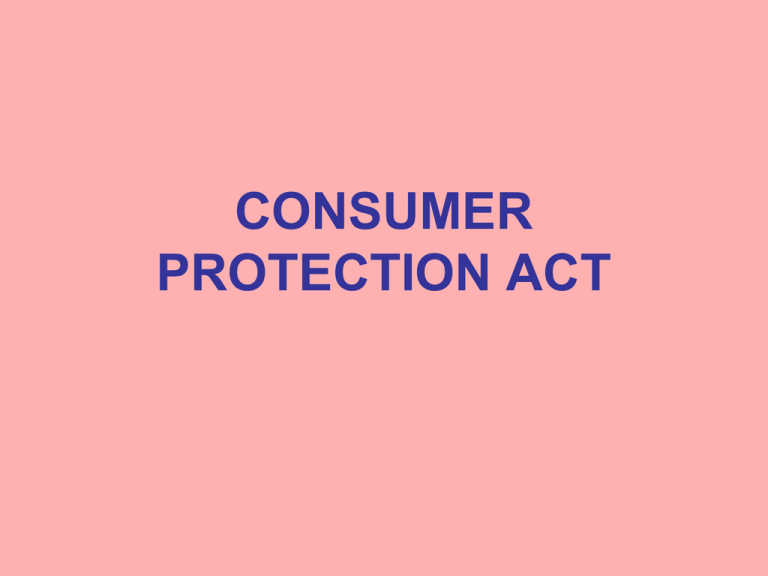
CONSUMER PROTECTION ACT Consumer Protection Act • Enacted by the Parliament in 1986 • To provide for better protection of interest of consumers. • To make provisions for the establishment of Consumer Councils and other authorities for the settlement of consumer disputes. Who is a Consumer? • Consumer is one who – Buys any goods for a consideration and includes a hire-purchaser; – Any user of such goods for consideration but excludes one, who obtains for re-sale or for commercial purposes; – Hires a service for consideration and includes a beneficiary of such service, if availed of with the approval of the hirer. Deficiency - Service • ‘Deficiency’ means – a fault, imperfection, shortcoming or inadequacy in quality, nature, or manner of performance than is required. • ‘Service’ includes – service in connection with banking, financing, insurance, transport, processing, supply of electrical and other energy, boarding or lodging, housing construction, entertainment, amusement or purveying of news and other information – but does not include any service free of charge or under a personal contract. What is a Complaint? • An allegation in writing by a complainant that: – An unfair or restrictive trade practice is practised by trader or service provider – Goods bought or to be bought or services hired or to be hired suffered from any deficiency – Trader or service provider has charged excess price – Goods and services are hazardous or are likely to be hazardous to life and safety. Who is a complainant? • A consumer • Any voluntary consumer association registered under the Companies Act or any other law • Central or State Government, if it makes a complaint • One or more consumers having same interest • In case of death of a consumer, his legal heir or representative. A Consumer Dispute arises when a complaint is denied or disputed. Machinery under the Act • Central Consumer Protection Council – to be established by Central Government • State Consumer Protection Council – to be established by State Government • District Consumer Protection Council – to be established by State Government for every district Consumer Dispute Redressal Machinery • There are Consumer Fora at the District, State and National level – District Forum – At the District level – State Commission – At the State level – National Commission – At the National level Pecuniary Jurisdiction • Forum where complaints can be entertained – Depends on value of goods and service and compensation claimed • Limits are : – District Forum • not exceeding Rs.20 lakhs – State Commission • exceeds Rs.20 lakhs but does not exceed Rs.1 Crore – National Commission • exceeds Rs.1 Crore. Territorial Jurisdiction • Territorial Jurisdiction lies in the court of the place – Where the opposite party resides or carries on business or personally works for gain – Where the cause of action wholly or partly arose. Disposal of disputes • District Forum may – – – – ask the opposite party to remove the defect, replace the goods with new goods and free from defect to return to the complainant the price of goods or to pay any amount as compensation • Appeals to be preferred within thirty days – from the order of the District Forum to the State Commission and – from the order of the State Commission to the National Commission • Can entertain appeals beyond thirty days – on sufficient cause shown for the delay It has to be disposed within ninety days from its admission. Time Limit for filing complaint • Within two years from the date on which the cause of action arises • Even where the time limit expires, the complaint can be taken up – provided complainant is able to satisfy the Forum or Commission about the reasonableness in the delay • The delay for every single day has to be explained. What are the rights of a ‘consumer’? – Protection from hazardous goods and services – Information about the quality, quantity, purity, standard and price – Access to a variety of goods and services at competitive prices. – Assurance that his interest will be considered at appropriate fora – The right to consumer education PROBLEM - 1 • • • • A had purchased seeds from a party. The seeds did not germinate. The party which supplied seeds took the plea that A was not a consumer. Is purchase of seeds for the purpose of agriculture, a purchase for commercial purpose? PROBLEM - 2 • • • A had applied for electricity connection. However, power supply was not provided to A. Can A seek redressal of his grievance in Consumer Court? PROBLEM - 3 • A’s car met with an accident. • The insurance claim was rejected on the ground that A’s driver was not holding valid driving license. • Should A approach a Consumer Court for seeking the Insurance claim? PROBLEM - 4 • • • A’s grievance is that he had registered with the M.I.G. Scheme of the Haryana Housing Board. The board had escalated the price of the flats three times within a period of two years. Does his case lie within the jurisdiction of Consumer Fora? PROBLEM - 5 • • A registered letter sent to A was not delivered. What is the liability of an employee of the Post Office in this matter? PROBLEM - 8 • • • • A injured his knee in a game of football. It was diagnosed as ACL TEAR. For that, he was operated upon in the knee. After the operation his knee developed stiffness, which is unusual in such cases. • Even after undergoing physiotherapy for two months he was unable to bend or straighten his knee. • So after two months of operation his knee was manipulated under anesthesia to relieve stiffness. • A plaster was put on he knee for one month. • • • • He was told to start walking. He used to walk with a limp. For about 8 months he continued to walk with a limp. Then, his condition deteriorated and he had to start using crutches to move around. • Both operations were carried out in military hospitals, and they were done free of cost since he was serving in army. • Can he sue the doctors and the hospital for negligence and deficiency of service under Consumer Protection Act? 21 22
